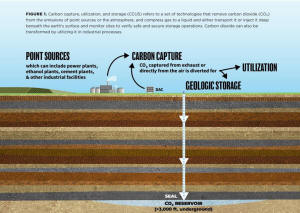Move underway to protect Illinois aquifer from carbon sequestration
leaks
 Send a link to a friend
Send a link to a friend
 [October 08, 2024]
By Greg Bishop | The Center Square [October 08, 2024]
By Greg Bishop | The Center Square
(The Center Square) – Following another leak at the Archer Daniels
Midland carbon injection facility in Decatur, Illinois, some are looking
for more protections for water supplies.
In September, the U.S. EPA announced a proposed enforcement against ADM
for alleged violations of the Safe Drinking Water Act after a fluid
leak.
“EPA alleges the company violated its Class VI Underground Injection
Control permit when injected fluid migrated into an unauthorized zone
roughly 5,000 feet deep,” the federal agency said. “The fluid migration
was caused by holes in one of ADM’s monitoring wells. According to the
company, the lower portion of the well has been plugged to stop further
fluid migration.”
At that time, state Sen. Chapin Rose, R-Mahomet, urged for his measure
protecting aquifers from carbon dioxide injections be passed.

“This is exactly what I was sounding the alarm about back in May when
Democrats were ramming through their supposedly ‘green’ Carbon
Sequestration bill,” Rose said on Sept. 13. “This is exactly why that
bill should not have passed, why Governor Pritzker should never have
signed that bill. Because it leaves the Mahomet Aquifer exposed to this
exact danger. And this is why my legislation … which would protect the
aquifer from CO2 injection needs to be passed immediately.”
The Protect the Mahomet Aquifer Coalition said another leak at ADM
revealed weeks later shows the importance of bills to prohibit carbon
sequestration activity around aquifers.
"Our drinking water cannot be put at risk by these ongoing failures,”
said Pam Richart, co-director of Eco-Justice Collaborative and a leading
member of the Protect the Mahomet Aquifer Coalition. “It’s time for
lawmakers to step in and ban CCS projects under the Mahomet Aquifer once
and for all."
The group is advocating for action from the statehouse after the
November election with bills from state Rep. Carol Ammons, D-Urbana, and
state Sen. Paul Farci, D-Champaign, “to prohibit carbon sequestration
activity over, under, or through a sole-source aquifer” to be discussed
during veto session.
[to top of second column]
|

A graphic from a Prairie Research Institute report on carbon capture
and storage - Prairie Research Institute, University of Illinois

Gov. J.B. Pritzker said it was a good thing ADM ceased operations to
further investigate any leaks.
“Yeah, it’s always a concern of course when someone is not able to
meet the EPA standards, these are federal EPA standards, and I think
the EPA has taken proper notice as well,” Pritzker said last week.
“I’m glad of that. I think we need to pay attention to it.”
He urged for patience as the state’s regulations of carbon capture
sequestration play out over the next two years.
“We’re going to evaluate as we move forward what the federal
government is going to do because we’re waiting for them to come out
with some pipeline standards as well as other work around the
regulations around CCS because this really is relatively new,”
Pritzker said.
ADM said “there is no risk or impact to the surface or groundwater
sources or any threat to public health.”
The Protect the Mahomet Aquifer Coalition said while ADM has paused
the program, the second leak “proves that carbon capture is not the
safe, reliable technology its proponents claim it to be.”
Pritzker said the aquifer is safe. As to proposed legislation to
bring more safeguards, Pritzker was reluctant.
“I think we should do our best, everything, to make sure that we’re
protecting the Mahomet Aquifer,” he said. “I’m not sure that that
bill is the right answer.”
The Illinois Clean Jobs Coalition said in a statement last month,
“it’s not a matter of if carbon sequestration facilities leak, but
rather when.”
 |